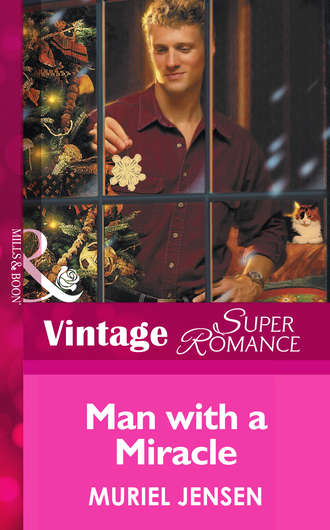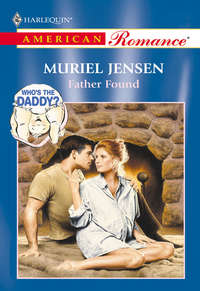
Полная версия
Man With A Miracle
That was ridiculous, she told herself briskly, quietly opening the door. It was probably just Evan returning home. That possibility was still a little scary, but not in the same way.
He didn’t like her, didn’t trust her, and had invited her to stay with him out of Christian charity. That should be good enough for her, but somehow it wasn’t.
Lucinda raced out the door past her, meowing.
Beazie tossed the towel aside, combed her fingers through her hair, then stepped quietly into the hall. Pausing at the top of the stairs, she heard the sound of female laughter from the direction of the kitchen.
A surprising thought hit her. Evan was married! And maybe had a daughter. She could hear two voices.
That possibility both relieved and distressed her, but she was too curious to analyze why. Then she heard a baby cry, and ran lightly down the stairs.
She arrived at the kitchen doorway and saw a baby carrier on the table and two women unloading what appeared to be casserole dishes and…clothing.
A small, dark-haired woman went to lift the crying baby out of the carrier and spotted Beazie. She smiled apologetically.
“I’m sorry we woke you!” she said, holding the baby to her with one hand and coming toward Beazie with the other outstretched. “I’m Haley Megrath.” She indicated the squalling baby. “This is Henrietta—Henri for short.”
Beazie shook her hand and duly admired the baby, then the woman indicated her friend, another dark-haired woman with a friendly smile. “And this is Mariah Trent. We’re friends of Evan’s. Mariah’s husband is his partner, Cam Trent, and my husband, Bart, is their lawyer.”
“Hi, I’m Beazie Deadham. I was already up and in the shower. What…?” She pointed to the clothing draped over chairs.
“Oh, right.” Haley took a bottle out of her purse on the table and put the nipple in the baby’s mouth. Henrietta stopped crying instantly and made urgent, sucking sounds. “Mariah and I are heading up a committee to supply the food and clothing bank for a new homeless shelter.”
Beazie nodded, remembering that Evan had mentioned the shelter.
“So, we’ve been gathering clothes. I’ve personally contributed a lot because I needed some new things after the baby came.” She rolled her eyes. “Thickening waist, bigger hips. You know.”
Beazie didn’t, but she couldn’t imagine what this woman had looked like before, if the figure she sported now in jeans and a simple sweater was thicker than it had been.
“Anyway, he told Mariah about your arrival here with no change of clothes and wondered if we had anything you could use, since you and she are about the same size.”
Beazie picked up a rich-blue sweatsuit draped over the back of a chair. Then a softer-blue turtleneck sweater. She uttered a grateful gasp, feeling as though she’d just been given carte blanche at Filene’s.
Mariah held up a pair of blue jeans. “Think these will fit? They’re Haley’s. Sometimes men are wrong about sizes.”
Beazie shook her head regretfully. “I’m flattered to be thought the same size as Haley—” she smiled apologetically “—but I’m solid peasant stock. I’m a ten.”
Mariah folded up the jeans and dug into another bag. “Good. You are my size.” She smiled conspiratorially. “It’s the chocolate. And Haley’s always running around chasing news stories, so she gets more exercise. She’s publisher of the Maple Hill Mirror. I just drive children around and wait for them to finish ballet lessons, tai chi lessons, swimming lessons, soccer games, baseball games, basketball—”
“She gets the point,” Haley interrupted, then said to Beazie, “Why don’t you just look through what we’ve brought and take what you want. My sweaters would fit you.”
Beazie clutched the sweats and sweater to her and took the jeans Mariah held out. “Two changes of clothes will see me through. I feel guilty taking from the homeless.”
“We’ve collected lots of things,” Haley insisted. “Help yourself with a clear conscience. And Mariah made a couple of casseroles so you won’t have to cook for a few days. I don’t think Evan cooks at all.”
Beazie felt called upon to come to his defense. “He does make good coffee, though.”
Haley moved the baby to her shoulder and patted her back. “He’s great, and we all love him, though he’s pretty private. He’s always the first one to offer help if one of us needs it, so it’s nice to be able to help him in a small way.”
Mariah turned from putting the last of the casseroles in the refrigerator and dusted off her hands. “Just about filled that up.” Then she reached to the floor for another paper bag. “These are toiletries and some makeup samples I got at a house party and never used.” She put the bag on the table and pulled out a few things. “We thought if you needed clothes, you might need some other things, too. Shampoo and conditioner, moisturizer, a sample bottle of perfume.” Then she put it all back. “So you don’t have to use guy stuff.”
Beazie was overwhelmed, and couldn’t help wondering what Evan had told them. “I don’t know how to thank you.”
Haley waved away the necessity for thanks. “The only thing we couldn’t find was shoes. What size do you wear?”
“Eights.”
Mariah shook her head regretfully. “Haley’s are too small and mine are too big. But there is…” She rummaged in several bags and emerged triumphantly with a pair of pink chenille slip-on slippers. “Here. At least you can be comfy around the house.”
Beazie sat down and put the slippers on. They were perfect.
The baby burped loudly and Haley laughed. “Well. Our work here is done.” She stood to go.
Mariah began collecting empty bags and pushed those still full of clothes against the cupboards and out of the way. “Pick through those and just return what you can’t use.”
“Can you stay for coffee?” Beazie asked, remembering belatedly her good manners.
“Thanks,” Mariah said, “but I have kids to pick up, and Haley has to get to a Traffic Safety Committee meeting. We have lunch with Jackie every Friday, though. Would you like to join us?”
“Jackie’s the mayor of Maple Hill,” Haley explained. “My sister-in-law.”
Beazie nodded, following them as they moved toward the door. “Evan told me about that. Your brother has a company of tradesmen temps.”
“Yes. Turned out to be a brilliant idea. They’re so busy, though, the jobs are hardly temporary anymore.”
“We’re all in the phone book,” Mariah said, opening the door for Haley and the baby. “If you can’t remember names, just call Whitcomb’s Wonders—that’s the company—and Haley’s mom is usually taking calls. She can reach any one of us.”
“Thank you again.”
“Sure. You take care.”
Beazie watched as Haley fastened the baby seat in the back of a green sedan and Mariah climbed into the passenger seat. Haley tapped the horn as she drove away.
Beazie closed the kitchen door behind her, then, noting the late-afternoon shadows, flipped on the light. Silence fell on her like a blanket. The sudden arrival of the two women and the baby had been like a cheerful tornado in the quiet house, and now that they were gone it seemed even more silent than before. While she could acknowledge that solitude was preferable to being chased, she’d spent most of the past six years trying to chase away the silence.
That was the worst part of loneliness, she’d often thought. A single person had only the sounds of the clock, the refrigerator, and the television, which she usually put on the moment she arrived home and turned off just before she went to sleep.
But a house should have the cheerful noise of projects under way. The hum of a sewing machine, the whine of a saw, the discordant but encouraging music of a child learning an instrument, the bark of a dog.
This house had the look of what she wanted, she thought, turning in a tight circle to take in the kitchen, but none of the sounds. She experienced one brief moment of utter and complete loneliness, then forced herself to bury it and move on. She knew how to do that. She’d done it many times.
She took the bags of clothes upstairs and spent the next half hour trying things on. She kept two pairs of Mariah’s jeans, a blue and a black, a simple black skirt and sweater, and a green fleece top patterned with red poinsettias. Christmas was just around the corner. She put on the blue sweats, hung the things she was keeping in the wardrobe, then packed everything else back into the bags and stashed them to return tomorrow.
Then she padded downstairs in the slippers and checked out the casseroles. There was ham, potato and broccoli casserole in a square dish, lasagna in an oblong one, and chicken and noodles in a round bowl, each thoughtfully labeled with cooking time and temperature.
She took out the square casserole and preheated the oven. Mariah had also left a bowl of salad and a bag of dinner rolls on the counter.
When she searched the cupboards for plates, Beazie was surprised to find a four-place setting of fine china, patterned on the rim with red and yellow flowers and a gold trim. She took down two plates and stared at them. She’d expected a bachelor to have pottery or plastic.
After setting the table, she made a pot of coffee, put a small fern she’d found in the living room in the middle of the table and waited for Evan to come home.
EVAN HAD NOT BEEN GREETED at the door in— Well, he couldn’t remember how long it had been. Probably since his mother welcomed him home when he was in high school.
And it had been that long since he’d walked in the door to the aroma of dinner in the oven, coffee brewing and a woman fussing around him, a floral perfume wafting in her wake.
Well, Beazie wasn’t fussing, but she’d come to take one of the two grocery bags he carried. And when he saw her, for a moment he couldn’t move.
She’d showered and shampooed her hair and tied it up with a piece of twine into a fat, glossy ponytail. The blue sweatshirt she was wearing intensified the blue of her eyes, and when he looked for her freckles, he couldn’t find them. She had a finished, almost glamorous look—despite the sweats. And she was giving him that smile.
He felt himself wanting to go back outside and drive away. He knew this woman could be dangerous, and not just because she was being chased. Still, he’d sometimes been stupid, but he’d never been a coward. And she needed help.
“Hi,” he made himself say with an answering smile as he went to the counter with the other bag of groceries. “Mariah must have been here.”
“She was.” She pulled canned soups and vegetables out of the bag and lined them up on the counter. “Thank you. It was thoughtful of you to scrounge a wardrobe for me. And she brought me shampoo and makeup.”
He nodded. “I noticed the freckles were gone.”
“Not gone, just undercover. Mariah and Haley also brought three casseroles so I wouldn’t have to cook—because everyone seems to know that you don’t.”
“That’s because every time we have a gathering and I have to bring something, I get it from the deli. Dead giveaway.”
“You’re lucky to have friends who want your company.” She folded the now-empty paper bag. “Anyplace in particular you’d like these things?” She opened a cupboard and analyzed its meager contents. “Is there a system?”
“No. There’s seldom anything in there. Just put it wherever you like.”
“Okay.” She began putting things away with a swift confidence that spoke of experience. She paused to grin as she held up a jar of peanut butter and a box of grape Kool-Aid that were already in the shelf. “Do you like your peanut butter with jelly or marshmallow cream?”
He put the bags in a recycling bin at the edge of the counter and pulled off his jacket. “I don’t like it at all,” he answered. “I baby-sat for Cam and Mariah one night at the last minute, and Mariah, knowing how I am, sent those things with the kids so they’d have something to snack on. We went out for pizza, instead.”
“I love peanut butter,” she said, placing it back on the shelf and collecting canned goods around it. “I practically lived on it when I was first on my own because it’s so economical and nutritious.”
He thought it strange that they were talking about peanut butter and groceries, when just this morning she’d been bedraggled and hunted and holding a bat on him. Tonight she seemed like any well-adjusted young woman performing the simple domestic duty of stocking her shelves.
Only they were his shelves. And neither one of them should forget that.
The timer rang and she closed the doors on a very orderly cupboard, picked up two kitchen towels to use as pot holders and pulled the casserole out of the oven. It smelled wonderful.
He poured water and coffee, and they sat across from each other at the table. For the first time since he’d walked in the door, he felt tension. He ignored it, sure it must be just his own reaction to having a strange woman in his home after a year of comfortable solitude.
“Where’s your family?” she asked companionably, passing him the basket of rolls. “Were you born in Boston?”
His family. He missed them, but he’d tried hard not to think about them since leaving home. He’d dealt with and accepted what had happened, but he couldn’t find his place in their circle anymore. It was easier to put them out of his mind.
“I was born in the Midwest,” he replied. “We still have a lot of family there. But my mother moved us to Boston when she married my stepfather.”
“I love Boston,” she said chattily as she buttered a roll. “I was born in Buffalo. We moved to Boston when my mother remarried after my father died.” She took a dainty bite of the roll. “But that didn’t work out and she married a third time, then a fourth. The last husband was a banker, an older man who seemed very steady and solid, but she got sick, and I guess that wasn’t what he’d planned for his golden years, so…” She made an awkward little movement with her hand. “He left, she died, and I…stayed in Boston.”
“How old were you?”
“Eighteen. Old enough to be on my own.”
He remembered himself at eighteen, mouthy and brash and confident in his mind and his body. Until he went to college and met better minds, stronger bodies, and felt all his confidence shrivel. He wondered if she’d had to take the few steps back that eventually brought maturity.
“At least, I thought I was,” she admitted after a moment, as though she’d read his mind. “Then I discovered how much parents do for you that you’re unaware of until you have to do it for yourself. And that supporting yourself has a million hidden expenses that keep you too broke to have lunch out, or meet your friends after work for a drink.” She sighed and gave him a frail smile. “And that being alone 24/7 is not the way I want to spend the rest of my life. To remedy that, I spent the year I was twenty-one on a determined search to find a soul mate. I went to a lot of parties, but was selective about whom I dated. But I still managed to get it wrong.
“I had narrowed my choices to two men I really liked. Turned out one was already engaged to a girl in California, and the other got arrested for insider trading.”
He had to smile. “Tough luck.”
She nodded with an answering grin. “True. So I gave up on the search, but I need company, noise, activity. I get so tired of the silence.”
“I came here to find silence,” he said. “After being a cop for twelve years, my head is full of noises I’d rather not hear again.” And after he’d been here for a while, he’d stopped hearing the crash in his head.
She studied him worriedly, and he stopped with a bite of casserole halfway to his mouth. “What?” he asked.
“Is it going to be hard for you to have me here? I mean, I know you invited me to be kind, but you’re beginning to regret it, aren’t you. I can see it in your face. When you walked in the door tonight, I could almost hear your thoughts. Oh, that’s right! She’s here. Well, I’ll have to make the best of it.”
Guilt made him defensive. She was absolutely right. “I thought nothing of the kind,” he denied, “so just relax.”
“I shouldn’t be here long at all.”
“I know that.”
“And I’ll work for my keep.”
“Yes.”
“And I’ll try not to pollute your space—but I sing when I’m working, and sometimes I talk to myself, and I like to have the radio—”
“You’re making a lot of noise,” he interrupted, “promising not to make a lot of noise.”
She sat back in her chair and folded her arms. “So you’re not the sweetheart you pretend to be, are you.”
Sweetheart? “I never pretended to be any—”
“No, I guess it’s not pretense,” she amended, leaning forward again to pick up her fork. “It just seems to come with the chromosome in some of you. You’re all concerned and protective, you offer reassurances in that voice every woman dreams of, then when we begin to believe it, you pull back. Or you’re on to other things.”
That assessment was so brutal, he didn’t know what to say.
“My mother fell for it three times,” she went on between bites, her manner curiously detached considering the intensity of the subject. “We could have gotten along when my father died if we’d leaned on each other, but she kept trying to find the magic he’d put into her life—and it just wasn’t there without him.”
He was beginning to see something here, a possible explanation for her softly spoken assault on the male character. “So…your life was probably difficult,” he guessed, “while she dragged you with her through three marriages and three stepfathers.”
She shrugged one shoulder, as though it didn’t matter. “The second marriage was nothing, really. He was a tennis pro who turned out to be a flake. He was never real enough for me to take seriously. It only lasted five months.”
“And the third one?”
“Almost a year. He drank too much.” She grew quiet.
“But the fourth marriage was different?” he guessed.
A line appeared between her eyebrows as she talked on, clearly lost in memories of her third stepfather.
“I was sixteen and beginning to feel lost because I knew my mother was. Hal was gray-haired and cheerful, and for a whole year things were perfect. They sailed and skied, and we took weekend trips to Buck’s County or the Poconos. He was easy to talk to and seemed to really care about us.” She took a few sips of coffee, leaned her forearms on the table and looked into his eyes. “Then he retired, my mother got sick, and it was clear from the beginning that it would be a long, debilitating illness. I got home from school, eager to share with him that I’d been accepted at Southern Massachusetts University, and he was gone. My mother said he’d told her that he’d worked hard all his life and looked forward to traveling and doing all the things there hadn’t been time for before.”
“That’s rotten,” he said, angry that a man could do that. “I’m sorry.”
She shrugged again. “My mother could have lived a long time. I’d gladly have taken care of her, but she gave up. She couldn’t find what she’d had with Daddy, and it just didn’t occur to her that she had the ability to make her own life worth living.” She added bleakly, “Or that I was still there.”
Now he got the picture. She hadn’t just been young and alone, she’d been betrayed and abandoned—several times.
“And on the strength of the hour you spent with me this morning,” he said, “and the half hour tonight, you’re assuming that I’m the same?”
She pushed her plate away. “You have that look,” she said, “that says you’d really rather not have to deal with me.”
Fueled by annoyance now, as well as guilt, he was vocal in his own defense. “First of all,” he replied, “you’re here, aren’t you? And you wouldn’t be if I didn’t want to deal with you. And secondly, you broke into my office, held me at batpoint, and told me some of your story, but not all of it, because you aren’t willing to trust me completely. And since that story involves a murder and a ruthless chase, you’re surprised that I’m a little wary of you?”
“You offered me shelter,” she pointed out. “I asked you to take me to the—”
“Further proof,” he cut in, “that I’m trying to help. I think what’s bothering you isn’t ‘that look’ I’m supposed to be wearing, but your own insecurities.”
Okay, that had been harsh. He wasn’t entirely surprised when her eyes brimmed with tears and she got up from the table with a wounded look—one that would keep him awake for hours—and ran upstairs.
Some sweetheart he was.
CHAPTER FOUR
BEAZIE WAS FROZEN, and she couldn’t determine where she was. It felt like she was in deep freeze. She was cold inside as well as out.
She must be dying. Tremors racked her, and she wondered if it was possible to rattle apart, for cold limbs to simply break off—the way pieces of your life sometimes did.
Darkness permeated everything, and she swore she could feel her life slipping away. She tried to remember the warmth of love, of belonging, of being needed, but it had been gone for so long.
She began to weep for it. Longing was cold, too, and only served to worsen her situation.
Then she heard the sounds of a car engine, saw headlights in her frigid darkness, then men with guns drawn, coming for her.
Конец ознакомительного фрагмента.
Текст предоставлен ООО «ЛитРес».
Прочитайте эту книгу целиком, купив полную легальную версию на ЛитРес.
Безопасно оплатить книгу можно банковской картой Visa, MasterCard, Maestro, со счета мобильного телефона, с платежного терминала, в салоне МТС или Связной, через PayPal, WebMoney, Яндекс.Деньги, QIWI Кошелек, бонусными картами или другим удобным Вам способом.









